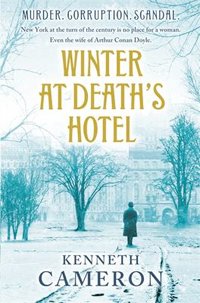 Written by Kenneth Cameron — Winter at Death’s Hotel is a crime novel I saw reviewed in a national Sunday paper. I bought it expecting a cosy and warm few hours’ journey through the literary conventions of a pastiche Victorian detective story. I could not have been more wrong.
Written by Kenneth Cameron — Winter at Death’s Hotel is a crime novel I saw reviewed in a national Sunday paper. I bought it expecting a cosy and warm few hours’ journey through the literary conventions of a pastiche Victorian detective story. I could not have been more wrong.
It is 1896 and the creator of Sherlock Holmes, Arthur Conan Doyle, has arrived in New York to start a lecture tour. With him is his wife, Louisa. They stay at an upmarket hotel, but just as they are about to check out to start their journey around the eastern states, Louisa trips up and badly sprains her ankle, making it impossible for her to accompany her husband. Reluctantly, he goes on without her.
Louisa and her maid Ethel stay in the hotel, but in the Bowery a terrible murder had been committed. Louisa is the first to realise that the atrocity is connected to the hotel. As she recovers from her injury and becomes more mobile, Louisa attracts the attention of the New York police, a campaigning journalist, and a police commissioner, one Theodore Roosevelt. Louisa becomes embroiled in a rapidly darkening spiral of murder, deceit and corruption.
Cameron peoples the book with several other real-life characters as well as Roosevelt. William ‘Buffalo Bill’ Cody, Sir Henry Irving and Marie Corelli all put in an appearance. His descriptions of the rough, tough and abrasive New York of 1896 are compelling and convincing. His descriptions of the sexual violence that men can inflict on women will not be to everyone’s taste and anyone who prefers euphemism over realism should look elsewhere for their entertainment.
I have a couple of minor criticisms. Firstly, Cameron is not the first author, nor will he be the last, to struggle with the thorny problem of phonetic speech. He tries, not with complete success, to convey the angular and abrupt New York accent, while forgetting that to our modern ears, Louisa’s accent would have been just as remote. Secondly, without giving away the plot, the topographical descriptions of the horrifying finale of the story just become too complicated and confusing.
Louisa Conan Doyle is a delightful heroine. She is not glamorous, but she is courageous, brave, intelligent and utterly believable. Cameron hints at early feminism, and he is persuasively convincing when Louisa’s sexuality and needs are brought into the story. Sadly, there is little room for a plausible sequel, as the real life Louisa died of tuberculosis in 1912.
This is a great read, but not for the faint-hearted.
Orion
Print/Kindle
£6.99
CFL Rating: 4 Stars








